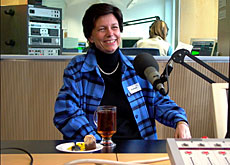
Swiss aims for seat on world court

Switzerland's Barbara Ott has failed to making the running in the sixth round of voting for judges to the International Criminal Court in The Hague.
But with seven judges still to be elected, she is seen as having a good chance of being chosen.
Ott is among 43 candidates for 18 available positions.
Success, though, has, so far, eluded Ott during the elections which are taking place at the UN in New York.
During the first ballot, she narrowly missed out on winning a post. She received only 45 votes – 11 short of the minimum 56 required.
Those chosen so far come from a broad mix of countries, including Finland Trinidad, Brasil, Costa Rica, South Africa, Ghana, South Korea and Mali.
In with a chance
Ott is seen as having a good chance both because of her pedigree and the fact that she is Swiss.
“Indications have come from different European countries that they would be favourable to having a Swiss candidate,” political analyst, Julian Hottinger, told swissinfo.
“But the judges will be chosen according to quotas. These are based on a fair representation of gender, and candidates must represent different regions of the world and legal systems.
“Although Ott is a good candidate, it’s hard to say what is going to happen.”
Ott herself is modest about her chances, even though she says Switzerland has been instrumental in getting the ICC off the ground.
She is upbeat about the court’s prospects.
“It is the first time there will be a permanent international court,” she told swissinfo. “It will not simply be reactive but also perhaps be able to pre-empt suffering within civilian populations worldwide [by acting as a deterrent].”
Credibility
Questions have been raised over the jurisdiction of the court, with several countries – most notably the United States – refusing to ratify the necessary treaties.
Washington has also put pressure on countries to grant US citizens immunity from prosecution.
Some European Union member states have already indicated that they would be willing to comply with the US’s wishes.
Far from interpreting such moves as an initial weakness of the court, Hottinger believes the ICC simply needs time to establish itself.
“There are many countries that believe – and Switzerland is among them – that the US should come in on the same terms as everyone else,” he said.
“But the ICC is just getting started and hopefully, given time, the US will become a full member once it sees it is working.”
Working together
Ott stresses that the ICC’s work will differ from the tribunals set up to investigate war crimes in the former Yugoslavia and Rwanda.
It will bring cases when individual countries are either unwilling or unable to bring prosecutions themselves.
“The two ad hoc tribunals were set up years after the crimes were committed,” she said.
“It has made it difficult to bring people to justice because they have often had the chance to flee from their country.
“But the new court will not have the same problems and it will also play a complementary role, urging countries to act themselves on their own territory.”
Strong candidate
Hottinger says Ott is a candidate with a strong reputation both at home and abroad.
She started her career by specialising in criminal law and worked as an investigating magistrate in Neuchâtel.
After being appointed a military judge, she spent six months in 1995 in Rwanda investigating war crimes on behalf of the International Criminal Tribunal for Rwanda.
In 1999 Ott was in charge of logistics and the witness protection programme in Lausanne during the trial of Fulgence Niyonteze, who was the first person to be tried outside Africa for genocide in Rwanda.
Election procedure
Of the 18 judges to be appointed, half will be elected to serve on a permanent basis and the others will serve on an ad hoc basis – only being called to The Hague when required.
Lots will be drawn to decide which category each of the judges falls into.
Furthermore, to avoid all positions becoming vacant at the same time, one third of successful candidates will serve for three years, one third for six years and one third for nine years.
Only those serving for three years will be eligible for re-election.
swissinfo, Jonathan Summerton

In compliance with the JTI standards
More: SWI swissinfo.ch certified by the Journalism Trust Initiative






























You can find an overview of ongoing debates with our journalists here . Please join us!
If you want to start a conversation about a topic raised in this article or want to report factual errors, email us at english@swissinfo.ch.